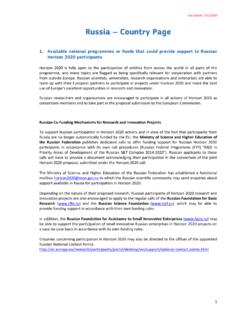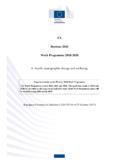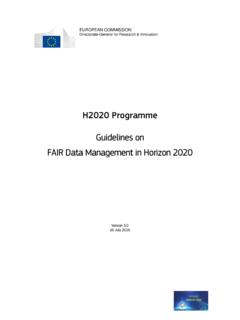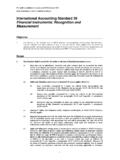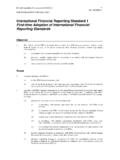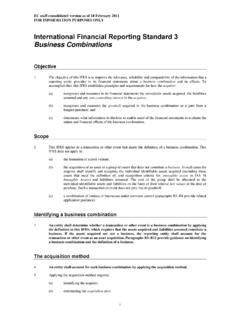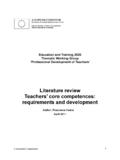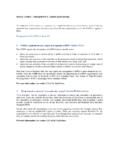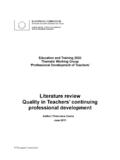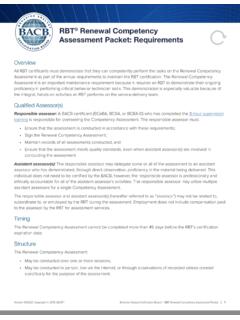Transcription of Report of the commission on the measurement of economic ...
1 Report by the commission on the measurement of economic performance and Social ProgressProfessor Joseph E. STIGLITZ, Chair, Columbia UniversityProfessor Amartya SEN, Chair Adviser, Harvard UniversityProfessor Jean-Paul FITOUSSI, Coordinator of the commission , IEP MembersRapporteursBina AGARWALU niversity of DelhiKenneth J. ARROWS tanfordUniversityAnthony B. ATKINSONW arden of Nuffield CollegeFran ois BOURGUIGNONS chool of Economics, Jean-Philippe COTISI nsee, Angus S. DEATONP rinceton UniversityKemal DERVISUNPDMarc FLEURBAEYU niversit Paris 5 Nancy FOLBREU niversity of MassachussetsJean GADREYU niversit LilleEnrico GIOVANNINIOECDR oger GUESNERIEColl ge de FranceJames J. HECKMANC hicago UniversityGeoffrey HEALC olumbia UniversityClaude HENRYS ciences-Po/Columbia UniversityDaniel KAHNEMANP rinceton UniversityAlan B.
2 KRUEGERP rinceton UniversityAndrew J. OSWALDU niversity of WarwickRobert D. PUTNAMH arvard UniversityNick STERNL ondon School of EconomicsCass SUNSTEINU niversity of ChicagoPhilippe WEILS ciences PoJean-Etienne CHAPRONG eneral RapporteurINSEED idier BLANCHETINSEEJ acques LE CACHEUXOFCEM arco MIRA D ERCOLEOCDEP ierre-Alain PIONNIERINSEEL aurence RIOUXINSEE/CRESTPaul SCHREYEROCDEX avier TIMBEAUOFCEV incent MARCUSINSEET able of contentsEXECUTIVE SUMMARYI. SHORT NARRATIVE ON THE CONTENT OF THE REPORTC hapter 1: Classical GDP Issues .. 21 Chapter 2: Quality of Life .. 41 Chapter 3: Sustainable Development and Environment .. 61II. SUBSTANTIAL ARGUMENTS PRESENTED IN THE REPORTC hapter 1: Classical GDP Issues .. 85 Chapter 2: Quality of Life.. 143 Chapter 3: Sustainable Development and Environment.
3 233 Report by the commission on the measurement of economic performance and Social ProgressEXECUTIVE SUMMARYWhy has this Report been written?1) In February 2008, the President of the French Republic, Nicholas Sarkozy, unsatisfiedwith the present state of statistical information about the economy and the society, asked,Joseph Stiglitz (President of the commission ), Amartya Sen (Advisor) and Jean PaulFitoussi (Coordinator) to create a commission , subsequently called The commission onthe measurement of economic performance and Social Progress (CMEPSP). TheCommission s aim has been to identify the limits of GDP as an indicator of economicperformance and social progress, including the problems with its measurement ; toconsider what additional information might be required for the production of morerelevant indicators of social progress; to assess the feasibility of alternative measurementtools, and to discuss how to present the statistical information in an appropriate ) In effect, statistical indicators are important for designing and assessing policies aimingat advancing the progress of society, as well as for assessing and influencing thefunctioning of economic markets.
4 Their role has increased significantly over the last twodecades. This reflects improvements in the level of education in the population, increasesin the complexity of modern economies and the widespread use of informationtechnology. In the information society , access to data, including statistical data, ismuch easier. More and more people look at statistics to be better informed or to makedecisions. To respond to the growing demand for information, the supply of statistics hasalso increased considerably, covering new domains and ) What we measure affects what we do; and if our measurements are flawed, decisions maybe distorted. Choices between promoting GDP and protecting the environment may befalse choices, once environmental degradation is appropriately included in ourmeasurement of economic performance .
5 So too, we often draw inferences about what aregood policies by looking at what policies have promoted economic growth; but if ourmetrics of performance are flawed, so too may be the inferences that we draw. 4) However, there often seems to be a marked distance between standard measures ofimportant socio economic variables like economic growth, inflation, unemployment, widespread perceptions. The standard measures may suggest, for instance that thereis less inflation or more growth than individuals perceive to be the case, and the gap is solarge and so universal that it cannot be explained by reference to money illusion or tohuman psychology. In some countries, this gap has undermined confidence in officialstatistics (for example, in France and in the United Kingdom.
6 Only one third of citizenstrust official figures, and these countries are not exceptions), with a clear impact on theway in which public discourse about the conditions of the economy and necessarypolicies takes ) There may be several explanations for the gap between the statistical measurement ofsocio- economic phenomena and citizen perception of the same phenomena: 8 EXECUTIVE SUMMARY The statistical concepts may be correct, but the measurement process may be imperfect. In many cases, there are debates about what are the right concepts, and the appropriateuse of different concepts. When there are large changes in inequality (more generally a change in income distri-bution) gross domestic product (GDP) or any other aggregate computed per capita maynot provide an accurate assessment of the situation in which most people find themsel-ves.
7 If inequality increases enough relative to the increase in average per capital GDP,most people can be worse off even though average income is increasing The commonly used statistics may not be capturing some phenomena, which have anincreasing impact on the well-being of citizens. For example, traffic jams may increaseGDP as a result of the increased use of gasoline, but obviously not the quality of , if citizens are concerned about the quality of air, and air pollution isincreasing, then statistical measures which ignore air pollution will provide an inaccurateestimate of what is happening to citizens well-being. Or a tendency to measure gradualchange may be inadequate to capture risks of abrupt alterations in the environment suchas climate change.
8 The way in which statistical figures are reported or used may provide a distorted viewof the trends of economic phenomena. For example, much emphasis is usually put onGDP although net national product (which takes into account the effect of depreciation),or real household income (which focuses on the real income of households within theeconomy) may be more relevant. These numbers may differ markedly. Then, GDP is notwrong as such, but wrongly used. What is needed is a better understanding of the appro-priate use of each ) Indeed, for a long time there have been concerns about the adequacy of current measuresof economic performance , in particular those solely based on GDP. Besides, there areeven broader concerns about the relevance of these figures as measures of societal well-being.
9 To focus specifically on the enhancement of inanimate objects of convenience (forexample in the GNP or GDP which have been the focus of a myriad of economic studiesof progress), could be ultimately justified to the extent it could be only through whatthese objects do to the human lives they can directly or indirectly influence. Moreover, ithas long been clear that GDP is an inadequate metric to gauge well-being over timeparticularly in its economic , environmental, and social dimensions, some aspects ofwhich are often referred to as sustainability. Why is this Report important?7) Between the time that the commission began working on this Report and the completionof this Report , the economic context has radically changed. We are now living one of theworst financial, economic and social crises in post-war history.
10 The reforms inmeasurement recommended by the commission would be highly desirable, even if wehad not had the crisis. But some members of the commission believe that the crisisprovides heightened urgency to these reforms. They believe that one of the reasons whythe crisis took many by surprise is that our measurement system failed us and/or marketparticipants and government officials were not focusing on the right set of statisticalReport by the commission on the measurement of economic performance and Social Progress9indicators. In their view, neither the private nor the public accounting systems were ableto deliver an early warning, and did not alert us that the seemingly bright growthperformance of the world economy between 2004 and 2007 may have been achieved atthe expense of future growth.
